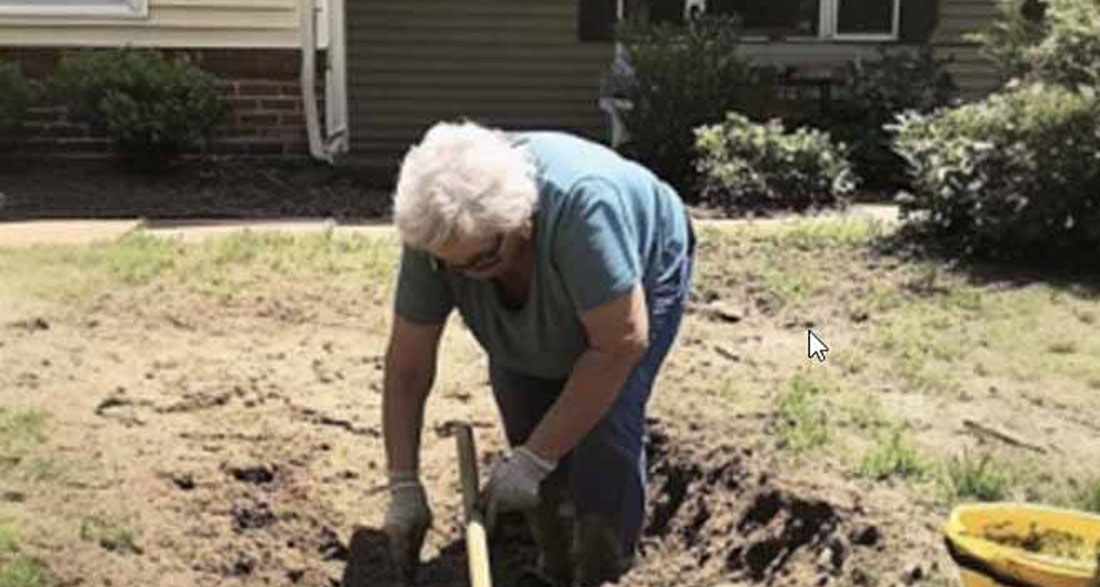It was an ordinary afternoon when something extraordinary happened. The sun was shining brightly, casting golden rays over our quiet street as I stood by the window folding laundry. My elderly neighbor, Mrs. Cartwright, was in her yard, as usual, doing what she always did—working on her garden. But today was different.
Mrs. Cartwright, always the picture of neatness in her cardigans and soft smiles, was digging furiously. Her frail arms jabbed the spade into the dirt with surprising force, her face covered in sweat. Something didn’t seem right. She looked… desperate.
I pulled open the window and called out to her, “Mrs. Cartwright, are you okay?”
She didn’t respond, not even a glance in my direction. She just kept digging, more urgently than ever. My worry grew. I called again, louder this time, “Do you need help?”
Still nothing. I hesitated, wondering if maybe she was just lost in her work. Maybe she was fine. I started to close the window, but just as I was about to, she dropped the spade, threw her hands up in the air, and shouted, “Finally!”
Then, in a sudden, awful moment, her small body crumpled to the ground.
“Mrs. Cartwright!” I cried, my voice trembling as I rushed out the door. I ran across the yard, my heart pounding. She was lying by the hole she’d been digging, her thin frame unmoving. I shook her gently by the shoulder, calling her name again. She didn’t stir.
Panic took over. I checked her pulse. It was faint but there. I could hear her breathing, slow and shallow, but steady. I felt a wave of relief, but still, I couldn’t just leave her there. As I tried to adjust her head for better airflow, something shiny caught my eye in the hole she had been digging. A wooden box? It was partially buried in the dirt, almost calling to me.
I hesitated. Helping her was the most important thing right now. But the box… it gleamed, even in the dimming light, and my curiosity grew.
“What were you looking for?” I whispered, glancing from the woman I was trying to help to the mysterious object in the ground. I couldn’t resist. I reached into the dirt, pulled at the box, and it came loose with surprising ease.
The box was weathered but intact. The lid creaked as I lifted it, and inside, bundles of letters tied with old, faded twine, yellowed photographs, and a sealed envelope lay waiting.
“What is this?” I murmured, almost to myself. I pulled out a photograph—a young Mrs. Cartwright, beaming beside a man in a military uniform. Her husband? I couldn’t believe it. These letters looked so old, yet somehow they had survived all this time. What kind of story had been buried with them?
As I flipped through the contents, a faint groan interrupted me.
“Mrs. Cartwright?” I asked softly. Her eyelids fluttered open.
“Where… where am I?” she rasped, her voice weak and hoarse.
“You collapsed,” I said, kneeling closer. “Stay still, I’ll call for help.”
“No!” Her hand shot out, gripping my arm with surprising strength. “The box. Is it… is it here?” She coughed, trying to sit up.
I pointed to the box beside me. “It’s here. But you need to rest, please.”
But she ignored me, her eyes wide with urgency as she reached for the box. “Let me see.”
Reluctantly, I handed it over. She cradled the box in her hands as if it were made of gold, her fingers tracing the wood gently.
“Sixty years,” she whispered, tears falling down her wrinkled cheeks.
“Sixty years?” I asked, my voice full of confusion.
“My husband,” she began, her voice trembling. “Before he went to war, he buried this. He said it was… to keep his dreams safe. He told me, if he didn’t come back, I should find it.”
I stared at her, unable to speak. It was like the world had stopped for a moment.
“He never came back,” she continued, her voice breaking. “I looked for this for years. I thought I had lost it forever.” Her eyes were distant, as though seeing something far away. “But then, I started dreaming about him again. He told me in the dream, ‘Under the tree, my dove.’ That’s what he called me.”
She smiled softly through the tears, but I could see the sadness in her eyes. “At first, I didn’t believe it. Just a dream, I thought. But something told me… something told me to dig.”
“And you found it,” I said quietly, trying to grasp the enormity of her words.
“Because of you,” she added, her voice filled with gratitude. “I couldn’t have done it alone.”
I was speechless. There was so much emotion in her words, so much history buried in that box.
“What’s in the letters?” I asked finally.
“Everything,” she whispered. “Everything he wanted to say but couldn’t.”
She reached for the envelope, her hands shaking as she ran her fingers over the seal. “Help me open it,” she said, looking up at me with eyes full of unsaid things.
I gently helped her tear the envelope open, and she pulled out a letter. The paper was thin and delicate, the ink faded but legible. Sunlight filtered through the trees, casting a soft glow on the letter as she handed it to me.
“Can I read it?” I asked gently.
She nodded, her voice barely a whisper. “Please.”
I cleared my throat and began to read aloud:
“Dear Family,
If you are reading this, it means my dove has found what I left behind. First, know that I loved you all, even those I never had the chance to meet. This world moves fast, and we forget what matters most. But love—love always stays. Take care of one another. Forgive, even when it’s hard. And don’t let time or distance make you strangers.
Inside this envelope, I’ve left a locket. Ruthie knows its meaning. Pass it down as a reminder: no matter what life brings, hold on to each other. Love is what lasts.
With all my heart,
Your father and, I hope, grandfather.”
I paused, glancing at Mrs. Cartwright. Tears streamed down her face as she reached for the letter. She took out a small, intricate locket from the envelope and opened it carefully. Inside, there was a tiny photograph of her and her husband, smiling, frozen in time. The locket seemed to shimmer in the sunlight, glowing with memories of a love that had endured through decades.
“He always said this would outlast us both,” she whispered, her voice thick with emotion. “And now, here it is.”
“It’s beautiful,” I said softly, my heart aching for her.
She turned the locket over in her hands, deep in thought. Then she looked at me with a serious expression.
“You should have this,” she said.
I blinked, startled. “What? No, Mrs. Cartwright, this is for your family…”
She looked at me with such sincerity. “Robert believed in timing. He believed that things came to people when they were meant to. I think he’d want you to have it.”
I hesitated. This wasn’t mine. But her eyes were so full of trust, so full of meaning. Slowly, I reached out and took the locket. It was warm in my hand, as though it carried the weight of the past with it. “I’ll take care of it,” I promised.
“I know you will,” she said softly.
In the days that followed, we went through the letters together. Each one revealed a new chapter of her husband’s life—his love, his courage, his dreams of coming home. As she read through the letters, she would share stories with me.
“He wrote about everything,” she told me one evening. “How he missed me, how he dreamed of coming home. But most of all, he wanted us to stay close, no matter what.”
I could see how much those words meant to her, how much they meant to their family. “Have you thought about sharing these with your family?” I asked her one evening.
Her expression faltered. “We haven’t spoken much in years,” she admitted. “After Robert passed, we all drifted apart. There were arguments, regrets…”
“That doesn’t mean it’s too late,” I said gently. “This could bring them together again.”
She didn’t respond immediately, but I could tell the idea had taken root in her mind.
Two weeks later, Mrs. Cartwright invited her family over. With her health being fragile, I helped her prepare for the gathering. It was a simple reunion, but it turned into something so much more.
Her living room was transformed. The table was covered with the letters, photographs, and the locket, all laid out to tell a story. As her children and grandchildren arrived, there were hesitant smiles, awkward greetings, but soon they were gathered together. Mrs. Cartwright stood, her fragile body holding a strength I hadn’t seen before.
“These letters,” she began, her voice shaking but strong, “are from your grandfather. He wrote them during the war and buried them for us to find. They’re his way of reminding us what’s most important.”
Her oldest son picked up a letter and began to read. As he spoke, emotion filled the room. Some cried, others smiled through their tears.
“I remember this story,” one granddaughter said, holding up a photograph. “Grandma told me about this day!”
Mrs. Cartwright smiled, watching her family come together, the past connecting them all. The locket passed from hand to hand, each person marveling at the tiny photo inside.
“Grandpa wanted us to pass this down,” Mrs. Cartwright said as her youngest great-grandchild held the locket. “To remind us to stay close, no matter what.”
By the end of the evening, the once-distant family members were laughing and talking as though no time had passed at all. Mrs. Cartwright looked at me, her eyes sparkling with joy, and whispered, “You did this.”
“No,” I replied, my heart full. “Robert did. And you.”
She smiled, her eyes full of unspoken gratitude.
That night, as I walked back home, I held the locket in my hand. It felt different now—not heavy, but significant. A symbol of love, of memories, of a family rediscovered.
What began as an ordinary day had turned into something extraordinary. And as I glanced back at Mrs. Cartwright’s house, now filled with light and laughter, I knew that her husband’s message would live on, passed down to future generations, carried by the love that had brought them all back together.
What do you think of the story? Share your thoughts in the comments below!














